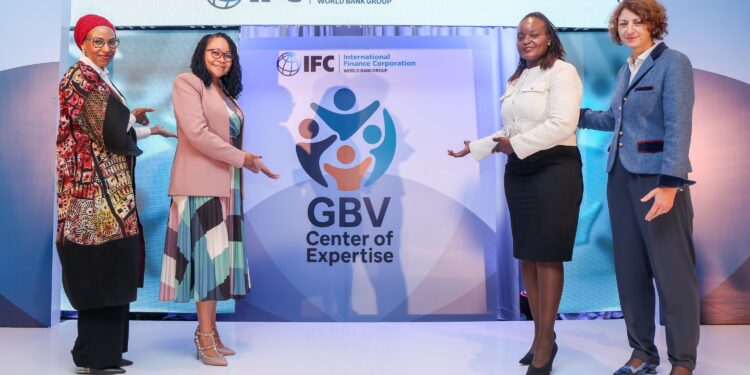The International Finance Corporation (IFC) has unveiled initiatives to tackle Gender-Based Violence and Harassment in Workplaces (GBVH). Through the launch of its Gender-Based Violence Centre of Expertise and the Respect@Work Program, IFC seeks to create a safer, more inclusive global workforce where every employee can thrive without fear of abuse or discrimination.
This development is not only timely but urgent. In Kenya, gender-based violence and harassment have long undermined workplace productivity, employee wellbeing, and overall organisational growth. The IFC’s initiative comes against a backdrop of rising cases of workplace harassment being reported to courts and labor institutions, with implications ranging from lost revenue to reputational damage for companies.
The Scale of the Problem in Kenyan Workplaces
Gender-Based Violence and Harassment in Workplaces is not just a “social issue”, it is a workplace crisis. A 2022 Federation of Kenya Employers (FKE) study revealed that 36% of female employees and 19% of male employees in Kenya had faced some form of harassment at work. More alarming is the fact that less than 30% of these cases were ever formally reported, largely due to stigma, fear of retaliation, or lack of clear reporting channels.
The Ministry of Public Service, Gender and Affirmative Action has estimated that workplace sexual harassment alone costs Kenyan businesses over KSh 5 billion annually in lost productivity, absenteeism, and staff turnover. For a country where the private sector contributes nearly 70% of formal employment, ignoring GBVH translates into direct economic loss.
“Gender-based violence and harassment is not just a personal issue, it is a workplace issue, and one that demands urgent and collective action,” said Gillian Rogers, IFC’s Principal Country Officer in Kenya. “The evidence is clear: workplaces free from violence and harassment are more productive, innovative, and inclusive.”
Landmark Court Cases in Kenya
The case of Wanjiru Gikonyo vs National Bank of Kenya (2019) marked a turning point in how workplace harassment is handled in the country. Gikonyo, a female employee, endured persistent sexual harassment from a supervisor and chose to take legal action. The Employment and Labour Relations Court ruled in her favor, awarding her KSh 3.5 million in damages. The judgment set a powerful precedent, affirming that employers can be held directly liable if they fail to act on harassment complaints raised within their organizations.
A similar concern came to light in the Ouko vs Moi University (2020) case, where a female lecturer reported harassment by a senior colleague. Initially, the institution dismissed her claims, reflecting a common tendency by many workplaces to downplay such complaints. However, the court ultimately ruled in Ouko’s favor, underscoring the responsibility of learning institutions not only to provide quality education but also to guarantee safe working environments for staff and students. This ruling reinforced the message that academic institutions are not immune to accountability when it comes to protecting their communities from harassment.
In Jane Doe vs State Corporation (2023), the courts delivered one of the most consequential rulings yet on workplace harassment. Jane Doe, a whistleblower, faced not only harassment but also retaliation after reporting misconduct. Recognizing the compounded harm, the court awarded her KSh 5 million, emphasizing that retaliation against victims can be just as damaging as the original act of abuse. This landmark judgment further strengthened the legal principle that victims of harassment must be protected at every stage, including after they come forward to seek justice.
Why Early Reporting is Crucial
Many workplace harassment cases in Kenya start subtly: unwelcome jokes, inappropriate messages, or suggestive comments. Left unchecked, these behaviors escalate into full-blown abuse. Victims often delay reporting, fearing job loss, victim-blaming, or even physical harm.
Early reporting of workplace harassment is crucial because it ensures that evidence is still fresh and easier to verify. When incidents are documented promptly, investigators and disciplinary bodies have a stronger foundation to take action, increasing the chances of fair and timely resolutions.
Reporting harassment early also helps to prevent escalation. Abusive behavior often starts subtly and, if unchecked, can grow into more serious violations. Acting quickly stops perpetrators in their tracks and prevents them from targeting other victims within the organization.
Another important reason to report early is the protection of mental health. Prolonged exposure to harassment can cause long-term emotional trauma, stress, and even depression. By addressing the issue at its onset, victims can reduce the psychological toll and begin the process of recovery sooner.
Finally, early reporting empowers others in the workplace. When employees see that harassment complaints are taken seriously and acted upon, it builds confidence in reporting mechanisms. This not only encourages more victims to come forward but also fosters a culture of accountability and respect within the organisation.
Victims in Kenya are encouraged to document incidents, seek support from trusted HR officers or unions, and use available complaint channels under the Employment Act 2007, which mandates employers with more than 20 employees to have a sexual harassment policy in place.
Mechanisms in Kenya to Address Workplace Gender Based Violence and Harassment
Kenya has made notable progress in putting in place structures to combat Gender-Based Violence and Harassment in Workplaces, with several legal and institutional mechanisms already in place.
The Employment Act of 2007, under Section 6, obligates employers to prevent sexual harassment and requires organizations with more than 20 employees to have clear written policies in place. This provision ensures that workplaces are not only aware of their obligations but also legally bound to create safe environments for their staff.
The Labour Institutions Act of 2007 further strengthens these protections by establishing the Employment and Labour Relations Court, a specialized body where employees can file harassment cases. This court provides a formal avenue for victims to seek redress and holds employers accountable when they fail to address complaints.
Beyond legislation, the Federation of Kenya Employers (FKE) has been instrumental in shaping workplace culture. Through initiatives such as the Kenya2Equal program, FKE provides training, advocacy, and policy guidance to employers, helping them build inclusive and respectful workplaces aligned with both local and international standards.
The National Gender and Equality Commission (NGEC) plays a monitoring role by ensuring compliance with gender equality laws. It acts as a watchdog that holds organizations to account while also promoting policies that advance gender equity across sectors.
Additionally, the Occupational Safety and Health Act of 2007 has broadened the definition of workplace safety to include not only physical protection but also mental and emotional well-being. By recognizing psychological harm as a workplace safety issue, the Act compels employers to prioritize holistic employee welfare.
Despite these frameworks, implementation remains uneven. Many small and medium-sized enterprises (SMEs), which employ over 80% of Kenyans, lack formal HR structures or policies, leaving employees vulnerable.
Lessons from Low\ Gender Based Violence and Harassment Countries
While Kenya continues to grapple with high levels of workplace harassment, there are valuable lessons to be drawn from countries that have made significant progress in reducing Gender-Based Violence and Harassment in Workplaces.
Sweden stands out as one of the nations with the lowest workplace harassment rates in the world. This success is largely attributed to the strict enforcement of gender equality laws, alongside mandatory training programs for employers and employees alike. The country also fosters a strong culture of whistleblower protection, ensuring that individuals who report misconduct are safeguarded from retaliation. Employers who fail to comply with these standards face steep penalties, reinforcing accountability across all sectors.
New Zealand has also established a robust framework by integrating ILO Convention 190 into national law. This legal reform requires all employers to establish independent reporting hotlines, ensuring that employees can raise complaints confidentially and without fear. In addition, employers must conduct annual staff surveys on workplace culture, creating a feedback mechanism that helps organizations identify risks early and implement corrective measures.
Canada, on the other hand, has implemented the Workplace Harassment and Violence Prevention Regulations, which obligate employers to carry out regular risk assessments within their organizations. Beyond identifying risks, the regulations also require employers to provide trauma-informed counseling services for victims, recognizing the long-term psychological effects of harassment and ensuring that victims receive adequate support to recover.
Taken together, these models highlight practical measures that Kenya can adopt to strengthen its own systems. Independent reporting and grievance redress mechanisms would provide safer avenues for employees to speak up. Mandatory workplace culture audits could help track progress and hold organizations accountable. Finally, stronger enforcement mechanisms, backed by clear penalties for non-compliance, would send a powerful message that harassment will not be tolerated in Kenyan workplaces.
Why Companies Must Take Action
Addressing Gender-Based Violence and Harassment in Workplaces goes far beyond legal compliance; it is a fundamental business imperative. Organizations that take proactive steps to tackle harassment are not only protecting their employees but also unlocking tangible business benefits that directly impact their growth and sustainability.
According to IFC research, companies that actively address harassment enjoy 22 percent higher employee retention rates. By creating environments where staff feel safe and respected, businesses reduce turnover, saving the significant costs associated with recruiting and training new employees.
Workplaces that are free from harassment also record a 30 percent increase in productivity. Employees who are not burdened by fear, stress, or trauma can focus fully on their work, leading to greater efficiency, creativity, and innovation.
Beyond performance metrics, companies that prioritize safe and respectful environments cultivate a stronger brand reputation. This reputation not only attracts top talent but also draws the attention of investors and partners who are increasingly prioritizing businesses with strong governance and ethical practices.
In contrast, companies that choose to ignore GBVH expose themselves to serious risks. They face costly lawsuits, the threat of strikes and work stoppages, high staff turnover, and long-lasting reputational damage. Ultimately, the cost of inaction far outweighs the investment required to create safe and harassment-free workplaces.
What Should Kenya Do To Address Gender Based Violence And Harrasment?
To build safer workplaces in Kenya, a comprehensive and multi-pronged approach is essential. This means going beyond existing frameworks and embedding stronger mechanisms that can prevent, detect, and address Gender-Based Violence and Harassment in Workplaces effectively.
First, mandatory GBVH policies should be put in place for every employer, regardless of company size. These policies must clearly outline what constitutes harassment, provide reporting procedures, and ensure that employees are aware of their rights and protections. By standardizing such policies, all workplaces would be compelled to prioritize employee safety.
Second, the establishment of independent reporting hotlines would go a long way in fostering trust. When reporting systems are managed by third parties, employees can speak up without fear of retaliation or internal bias. This independence ensures that complaints are handled objectively and transparently.
Third, organizations should conduct regular workplace culture audits, ideally on an annual basis. These surveys would help assess the prevalence of harassment and measure the effectiveness of existing policies. By gathering this data, employers can identify problem areas early and take corrective action before issues escalate.
Fourth, there must be stricter penalties for non-compliance. Employers who fail to address harassment should face meaningful consequences such as fines, license suspensions, or even blacklisting. Stronger enforcement sends a clear signal that harassment is not only unacceptable but also costly for organizations that ignore it.
Fifth, victim support services should be made widely accessible. Free counseling, legal aid, and guarantees of job protection would ensure that victims are not further disadvantaged for speaking out. These services are vital for helping employees recover and rebuild their confidence after experiencing harassment.
Finally, capacity building is critical. Human resource personnel, managers, and employees all need training to recognize the signs of harassment and to respond appropriately. Empowering staff with knowledge and practical tools will create a culture where harassment is not ignored but actively challenged at every level of the organization.
What Happens Next?
The Gender-Based Violence Center of Expertise will serve as a global hub, offering toolkits, training, and advisory support. In Kenya, the Respect@Work Program, part of IFC’s Kenya2Equal initiative in partnership with FKE, will allow employers to share best practices, learn from case studies, and align with global standards like ILO Convention 190.
By embedding these initiatives into Kenya’s labor ecosystem, IFC hopes to shift workplace culture from one of silence and fear to one of respect, accountability, and empowerment.
Gender-Based Violence and Harassment in Workplaces is a silent epidemic that stifles innovation, drains economic potential, and undermines human dignity. Kenya has taken commendable legal steps, but enforcement gaps and cultural barriers persist. IFC’s new initiative provides a much-needed opportunity to accelerate progress by aligning Kenyan workplaces with global best practices.
Workplaces should be centers of growth, not grounds of exploitation. For Kenya to unlock its full economic potential and advance gender equality, businesses, government, and civil society must rally behind a simple but powerful principle: every worker deserves to feel safe, valued, and respected.
ALSO READ: The Numbers Behind Stanbic Holdings’ Workplace Gender Parity And Equal Pay












